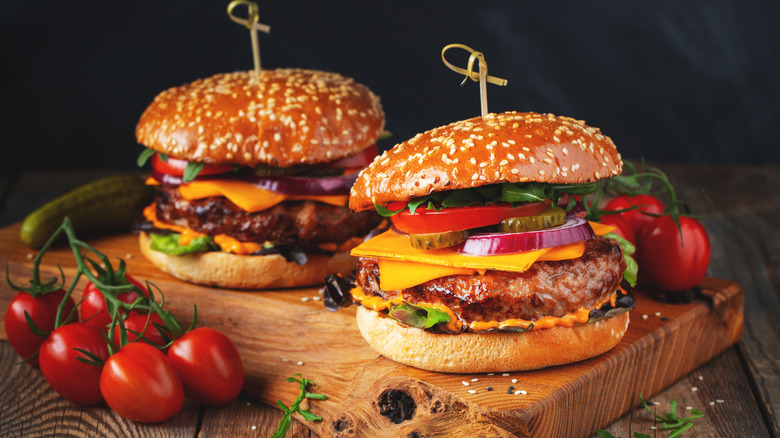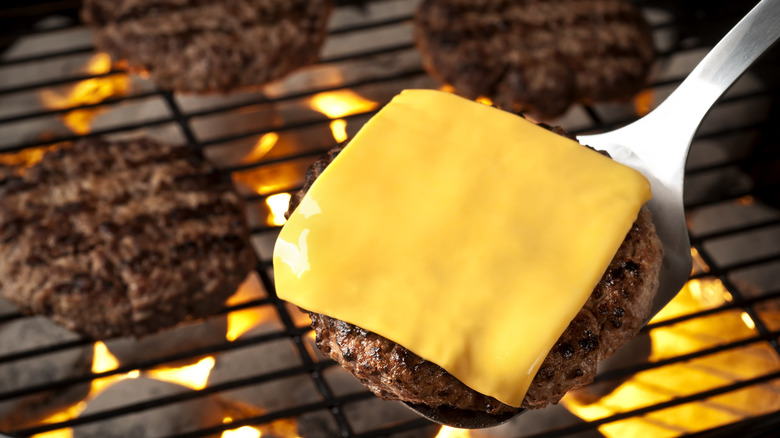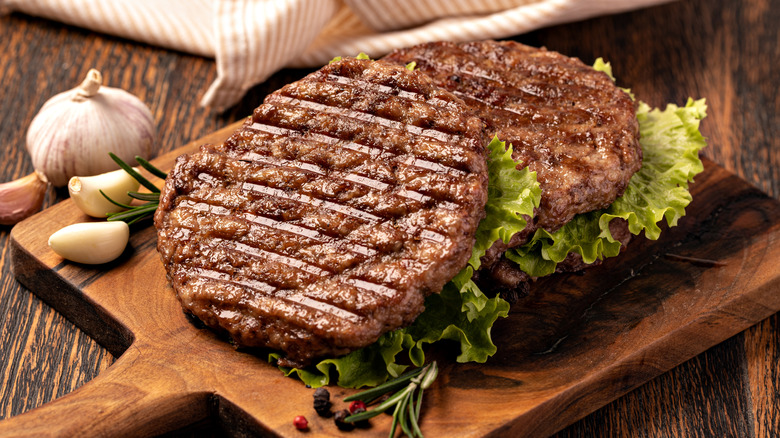The Unexpected Hack You Should Try For The Juiciest Burgers
Every backyard grill master will have a different take on how to make the perfect burger. Among the many important factors — taste, texture, toppings, time on the grill — how moist your burger ends up being cannot be overlooked. Nobody likes a dry, overdone burger — even those who order their meat well done. To preserve juiciness, restaurateur and three-time James Beard Award nominee Graham Elliot, for example, swears by the ice cube hack, in which you fold an ice cube into your beef patties as you are forming them. But another method suggests you skip the ice cube entirely and go straight to what really makes your burger juicy: water.
"I've been advocating adding water to burgers since 2007," says Dave Joachim, co-author with Andy Schloss of "Mastering the Grill," which is where he first suggested using ice water (via Reader's Digest). You just mix it right into the meat along with your spices, ideally moisturizing each pound of ground beef with 1½ ounces of water. "That achieves the same effect of making the burger juicier," Joachim notes. Whether you pre-season or not, make sure the water is mixed in thoroughly before shaping your patties.
The move is even approved by Michelin-starred and James Beard Award-winning pros. In his book "Charlie Palmer's American Fare," the eponymous chef writes, "I always add a bit of ice water to my burgers as it helps distribute the seasonings evenly as well as ensures that burgers stay moist and juicy."
No hole in your burger
Graham Elliot's rationale behind using an ice cube is pretty straightforward: The ice cube will melt during the cooking of the burger, turning to water, which then seeps in through the rest of the burger and ensures it stays extra moist. The thinking behind using an ice cube instead of just regular ice water is likely to start with the water at the coldest temperature possible so that the water doesn't evaporate during cooking.
Dave Joachim's criticism of the ice cube method has several different points. The first is that — as Charlie Palmer noted — the water is more easily and fully incorporated through the use of ice water rather than still-solid ice. He also points out that it can change how the burger is consumed since the ice cube will likely leave a hole in the patty after it has melted and soaked into the meat. Joachim likens this to tripping in a hole that catches you off guard during a walk.
The ice cube also lowers the temperature of the beef directly surrounding it in the patty's center. This, in turn, may cause the burger's center to be less cooked than the rest of the patty. Depending on how rare you like your burger, it may not even be fully cooked, opening the door to all manner of foodborne illnesses and bacteria. The use of ice water, evenly soaked into the ground beef before it hits the grill, minimizes this risk.
Similar methods for juicy burgers
There are, of course, even more methods for ensuring your burgers are as juicy as possible by the time you are ready to eat. They all involve preserving the moisture already naturally in the beef or adding to that moisture. For example, if you are grinding your own beef, you shouldn't wait too long to throw your patties on the grill after finishing grinding and seasoning. Waiting too long can give the meat a chance to dry out.
Other methods involve adding more liquid and flavor in one fell swoop. Dave Joachim suggests adding Worcestershire sauce, beef broth, or mushroom broth. This opens the door to considering other forms of broth or stock.
Also, remember that more fat equals more moisture in the meat. Beef that is too lean will lose its moisture much quicker than meat with a solid fat content. A commonly recommended beef-to-fat ratio is 80/20, meaning it's 80% beef and 20% percent fat. Joachim even encourages grillers to lean a bit more in the direction of fat, perhaps to 75/25. Another tip, not exactly for the health-conscious, is simply adding more fat — such as butter — to the burger as it cooks. This will bring not just extra juice to the meat but a luxurious savoriness, too.


